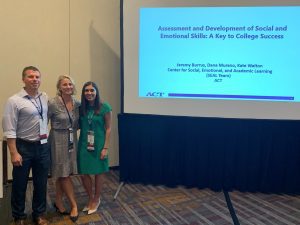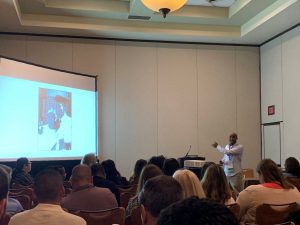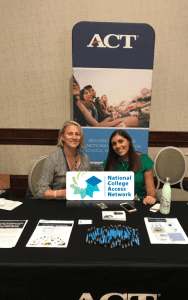 Last week, several colleagues from across ACT and I were honored to support and engage with attendees at the 2019 National College Access Network (NCAN) national conference “Racing Toward Postsecondary Success” and sponsor the social emotional learning (SEL) topic track. ACT’s Center for Equity in Learning supports SEL and the NCAN mission of working to build, strengthen, and empower communities committed to college access and success so that all students, especially those underrepresented in postsecondary education, can achieve their educational dreams.
Last week, several colleagues from across ACT and I were honored to support and engage with attendees at the 2019 National College Access Network (NCAN) national conference “Racing Toward Postsecondary Success” and sponsor the social emotional learning (SEL) topic track. ACT’s Center for Equity in Learning supports SEL and the NCAN mission of working to build, strengthen, and empower communities committed to college access and success so that all students, especially those underrepresented in postsecondary education, can achieve their educational dreams.
Through our work with more than 1,100 attendees representing college access advisors, school leaders, counselors, education organizations, and funders who reach hundreds of thousands of students and their families every year, we learned from and alongside others concerned about closing gaps in equity and strengthens two of our four pillars-partnerships and research. The conference also helps attendees celebrate successes, learn new strategies, gather resources to take back home, and to connect and explore opportunities to work together to strengthen our efforts and impact in college access.
As NCAN’s conference continues to increase in attendance they also expanded their conference topic offerings to attendees this year with a SEL micro track in which equity, social justice, school climate, learning, and measurement were interwoven with SEL in sessions sponsored by the Center. Among the many SEL track offerings were two sessions hosted by ACT, the first of which focused on SEL in the transition to postsecondary presented by Jeremy Burrus, Kate Walton, and Dana Murano from ACT’s Social, Emotional, and Academic Learning team. In this session, attendees were challenged to think about skills as they related to postsecondary and workforce success, learn new research and how to gain timely data-driven insights to understand students’ needs in order to improve programs and services and help more students pursue and obtain postsecondary degrees and workforce success.
 The second session featured Mawi Asgedom, founder of Mawi Learning and strategic advisor, Social and Emotional Learning for ACT. Mawi shared his amazing personal story and journey from a refugee camp to Harvard University and offered insights on how to apply SEL from his work with more than one million students around the world. Attendees learned evidence-based strategies to drive academic growth and student well-being through the application of SEL.
The second session featured Mawi Asgedom, founder of Mawi Learning and strategic advisor, Social and Emotional Learning for ACT. Mawi shared his amazing personal story and journey from a refugee camp to Harvard University and offered insights on how to apply SEL from his work with more than one million students around the world. Attendees learned evidence-based strategies to drive academic growth and student well-being through the application of SEL.
“As a first-generation college student myself, it was incredibly inspiring to join ACT’s Center for Equity in Learning in support of NCAN. It was an honor to train attendees on how to drive student growth by putting SEL into practice.” said Asgedom.
The conference offered three days of opportunities for learning via multiple session formats as well as via exhibit tables at both the SEL-themed Success Gallery Reception and while passing from one session to the next in the main exhibit hall. ACT’s exhibit tables were active with longstanding members and newcomers to NCAN – all curious and passionate about helping kids.
“I had many wonderful conversations about the power of SEL to drive student outcomes.” said Asgedom.
 ACT’s exhibit tables also offered expert advice from Kate Walton and Dana Murano on SEL and ACT Tessera. Bryan Contreras from MyOptions, provided free college and career resources, progress monitoring dashboards, and research that empowers counselors to help students navigate to college and career success. Lisa King from the American College Access Campaign shared information about supporting the more than 8,000 application completion events occurring across the country this fall and promoted #WhyApply Day to kick off the college application season, sharing supportive and motivating messages on social media about the importance of applying to college.
ACT’s exhibit tables also offered expert advice from Kate Walton and Dana Murano on SEL and ACT Tessera. Bryan Contreras from MyOptions, provided free college and career resources, progress monitoring dashboards, and research that empowers counselors to help students navigate to college and career success. Lisa King from the American College Access Campaign shared information about supporting the more than 8,000 application completion events occurring across the country this fall and promoted #WhyApply Day to kick off the college application season, sharing supportive and motivating messages on social media about the importance of applying to college.
We asked attendees to share: “Why is it important to apply to college?” We heard great respones to the #WhyApply question:
“Defy expectations for Hmong girls.”
“To keep learning, growing and working towards my goals.”
“To break the poverty cycle”, “Applying is the first step on a journey that changes lives.”
“Because you’re one app away from #educationforliberation.”
“Because you are college material!”
“Turn your dreams into your reality.”
The conference concluded with a plenary panel, “Taking Stock of the #CollegeAccess and Success Movement: A Conversation with Grantmakers.” Moderated by Caroline Altman Smith, of Kresge Foundation, and including panelsits Paul Luna of Helios Foundation; Danette Howard of Lumina Foundation; Bill Tucker of the Bill & Melinda Gates Foundation; and Amy Kerwin of Ascendium Education Group, each sharing their foundation’s story, challenges, and strategic areas of focus. Attendees heard what makes each foundation unique and the postsecondary access and success work that we all share, reinforced how we cannot do this work alone without partners. As a result, grantmakers are working together in collaboratives and aligning to set ambitious goals, pool greater amounts of funding to support communities of grantees working together to innovate and scale postsecondary access and attainment initiatives. Looking toward the future, Luna shared, “Using words like these or those kids are dangerous. We must view all kids as our kids. Every kid must be able to pursue their own pathways.” This quote really speaks to the work of the Center. In order for us to close equity and access gaps, we must continue to have the uncomfortable conversations about the barriers–including the words we choose to use–that prevent kids from pursuing education beyond high school.
“It is an honor to join my colleagues at NCAN to celebrate the hard work of so many amazing and inspiring individuals that are committed to doing whatever it takes to help the students that need us most! Beyond all the great things I learned, engaging NCAN’s network of schools, organizations, philanthropic foundations, education partners, and private sponsors proved to be one of the best conferences for my team to attend!” said Contreras.
This year, NCAN presented progress on closing the postsecondary attainment gap, FASFA completion and college application goals, however we have much work to do. Attendees left with the strong affirmation it is our job-our role-to reach out and help take care of and continue to support our young people and uplift our communities in the work we do, although it is tireless.
Stay tuned as we continue to support and provide college access resources.
